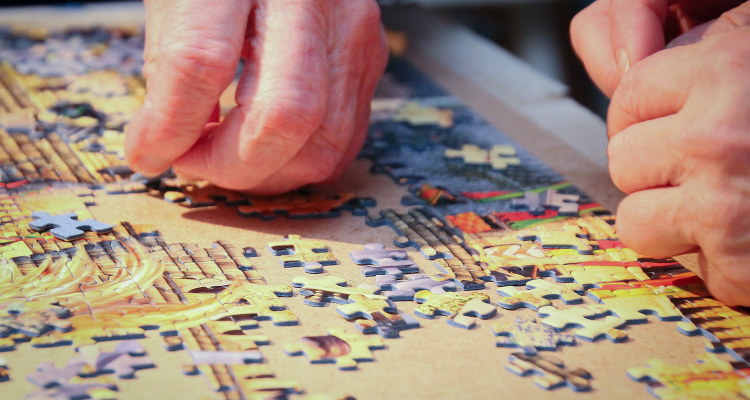Editor’s note: Have you noticed lately that bits of the past are creeping into the present? We’re gardening more, going to drive-in movies, spending time with nature, putting jigsaw puzzles together. We are finding that these traditional pastimes are somewhat calming in this time of COVID-19. Weelunk’s series, “Bygone Comebacks,” will take a look at some of the ways we’ve been slowing down. Today’s post looks at how jigsaw puzzles have evolved into a stress relieving hobby.
At the beginning of the year, my friend Suzanne handed me two jigsaw puzzles to take home after a visit with her. I thankfully took the puzzles, but also thought to myself, “I’ll probably never finish these.”
And then 2020 happened.
In March, we were sent home from work and school and told to stay home as much as possible. The weather was nothing but rain in March and April, and the question of “but, what are we going to do?” loomed over us as we realized self-isolation would not be ending anytime soon. At one point, I came across the puzzles my friend gave me and realized now would be the perfect time. It turns out I wasn’t the only one who thought this. Putting the stress of this year briefly on hold by putting a puzzle together, piece by piece, has become a coping mechanism for many.
Sales are soaring for puzzles during the pandemic. The popularity of jigsaw puzzles in 2020 results from the perfect storm of being forced to stay home and find ways to entertain yourself. What was once considered more of a hobby of generations past — before the more accessible and constant entertainment of our phones and social media captured our attention — has suddenly become relevant again.
Puzzles are a project you can sit down and do, either by taking your time or by seeing how fast you can be. For me, they have become a way to deal with some of the anxiety of the coronavirus and the year in general. I keep the puzzle I am working on on my coffee table and leisurely put a piece together here and there throughout the day. Sometimes I ignore it for days, while other times, I become obsessed with it and don’t want to quit. After scrolling through the news on a particularly bad day, I find myself at the puzzle.
It’s become a way for me to put things in order during what feels like a very disorganized time. It’s a way to complete something in a year that feels too interrupted.
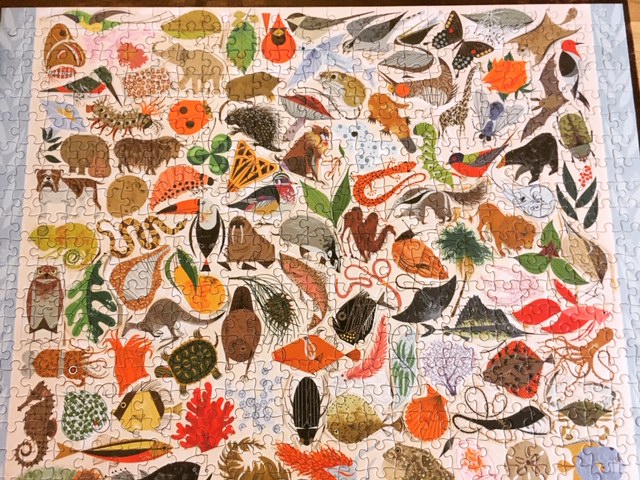
A CARTOGRAPHER MAKES A PUZZLE
Before this year, when I thought of puzzles, I would think of being a kid — or of the chunky, giant pieces I would put together with my children when they were smaller. Kids and puzzles go hand-in-hand because puzzles were originally made for learning — something kids are always doing. Puzzles were created as a learning tool, and their origin goes back to the map-making days of the 1760s when European mapmakers would paste a picture on wood and then cut them into pieces.
An engraver and cartographer, John Spilsbury, is credited with inventing the first puzzle in 1767. Spilsbury called his puzzles “dissected maps.” He would place a world map over wood and then carve out each country. Ever since then, making puzzles out of maps has been used as an educational tool. Spilsbury died in 1769 when he was only 30 and, most likely, would never have guessed his idea would grow into the hobby it is today.
The term “jigsaw puzzle” did not arrive until an actual jigsaw was used to cut the pieces around 1880, and the leap from education to hobby happened around the turn of the century.
Just as we live through a crisis in 2020 and find jigsaw puzzles to be a comfort, the same was true of many during the Great Depression. They were a cheap form of entertainment, and, I can only imagine, a way for those living through those uncertain times to focus on something other than their troubles.
A LOCAL HOBBY
Local professor and teacher Amy Criniti Phillips has always had a puzzle to occupy any downtime, but since the pandemic, she has been doing even more puzzles than ever.
“I have done many puzzles since March. Puzzles became one of the best ways to distract myself from the anxiety and uncertainty of the pandemic,” Amy explained. Puzzles are something she grew up with, and they have always been a family pastime. Now she continues the tradition with her own family.
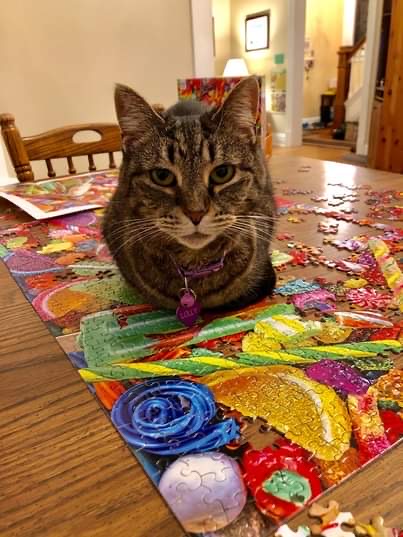
“I grew up doing puzzles with my family — over the course of a week, we would either work together or just individually add pieces until the puzzle was completed. My husband, 8-year-old-son and I have started the same tradition, which is really special.”
Amy says she is someone with a Type A personality. “For whatever reason, I become so focused on puzzles that I can find a few rare moments of complete escape from my mental to-do lists, daily worries, and — in particular — anxieties about the pandemic.”
Mandy Helt, a Martins Ferry resident who works in Wheeling, has found comfort in puzzles this year as well.
“Doing jigsaw puzzles was never something I enjoyed or made time for pre-COVID. I owned one puzzle, would start it and then abandon it for something else. When the pandemic hit I suddenly had nowhere to go and nothing else to run off to do.” One day Mandy was desperately looking for something to do that did not involve scrolling through Facebook or watching the news. She pulled out her one puzzle and, before the afternoon was over, she and her mother completed it. Thus, a new weekend activity was born.
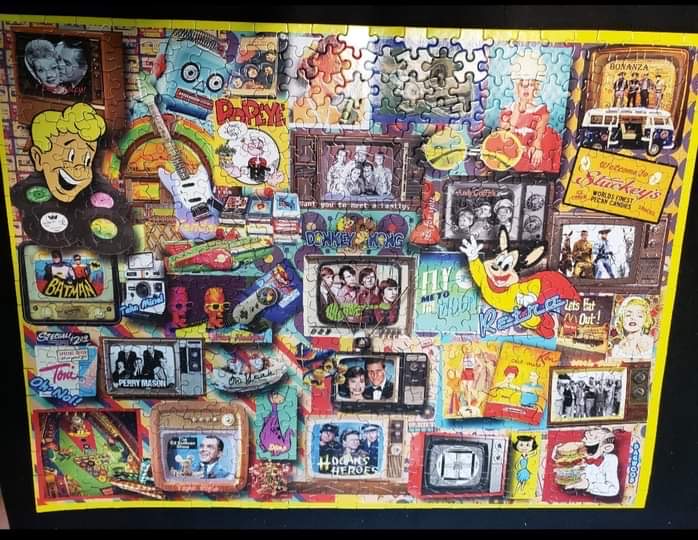
“I purchased a few more from Deluxe Novelty, a big toy store in Martins Ferry, from curbside pickup.” Puzzles are so popular now that some Mandy has ordered online have been on backorder. Her mother is in on the activity, too, and is also a quilter, so she tends to find puzzles where quilts are the main point.
“We generally have a few puzzles going at the same time. It just depends on what we want to work on.” Some of Mandy’s neighbors have started to enjoy puzzles as well. Where puzzles were frustrating before the pandemic to Mandy, she now finds them super relaxing. “It’s just a great way to pass the time, feel like I’m being productive, and a group effort.”
Not everyone had to have a pandemic to push them toward the hobby of jigsaw puzzles. Some residents of Wheeling have been doing them all along. Puzzles are a perfect way for individuals living in apartment buildings or in nursing homes to socialize while having an activity.
Ruth Vensel, a resident at Elmhurst House of Friendship for three years, has found the activity something she can do after suffering a stroke.
“I had a stroke and it left me so I could not write — there’s just so many things I can’t do, but the puzzles were here. It’s just something I can do.” Ruth lives on the same floor where the puzzles are kept and has made friends with other residents while completing puzzles. Many puzzles have been donated to the institution over the years, and the hobby is so common that one can find framed puzzles on Elmhurst’s walls from years past. The building’s maintenance man has matted and framed several puzzles residents have finished.
Similarly, there is always a puzzle in the community room for residents to do at the Clara Welty and Bertha Welty apartments. “24/7 there is always a puzzle,” said manager Betty Toland. “There are around five to seven residents on a regular basis who are always involved in the puzzles, but then you have some who just kind of walk by and hover a little bit and will put a piece in.” The puzzles give residents something to do. A lot of puzzles are donated, or residents purchase them themselves and share with everyone.
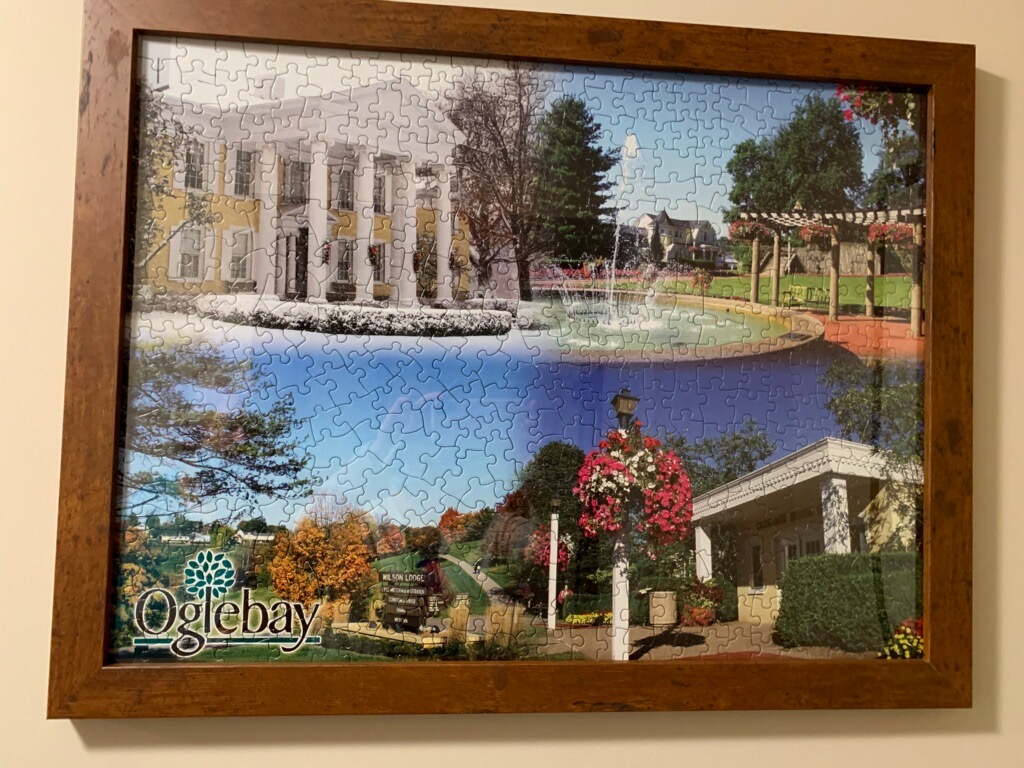
A PUZZLE FOR EVERYONE
It’s amazing to see all the different kinds of puzzles you can order today. Gone are the boring landscape puzzles you might remember from years ago.
Are you an AC/DC fan? There are puzzles of their album covers coming out soon. Are you an Edgar Allen Poe fan? There’s now a puzzle for that. Want a puzzle in the shape of a whale? Not a problem. Just a quick search on Redbubble, an online site where artists can have their work displayed on many products, will give you many beautiful and interesting puzzle choices. There’s even a line of puzzles of my favorite children’s author and illustrator, Emily Winfield Martin.
With the days getting shorter and the weather soon turning colder, I suspect puzzles will be a part of many families’ evenings. For someone like me who is not crafty or artsy, it is fun to feel like you are part of the process of putting together a piece of art.
I think I’m finally ready to graduate from my 500-piece puzzles and move on to 1,000 pieces. I’m feeling confident in my ability six months into the pandemic. As 2020 continues to throw us curveballs and uncertainty, I will take comfort in knowing there’s always a puzzle waiting for me when life feels a little too complicated. All I need to do is put the pieces together.
• Kelly Strautmann lives out in the country of Cameron, West Virginia, and proofreads in the city of Wheeling. She has a supportive and talented husband and two ridiculous daughters who keep her busy and full of love.


